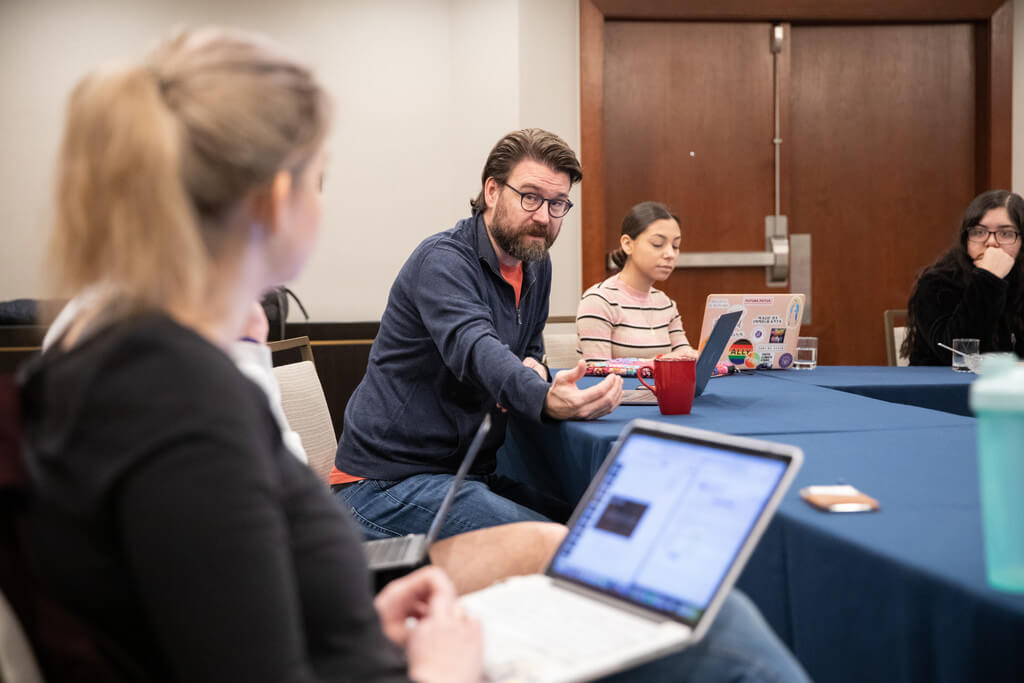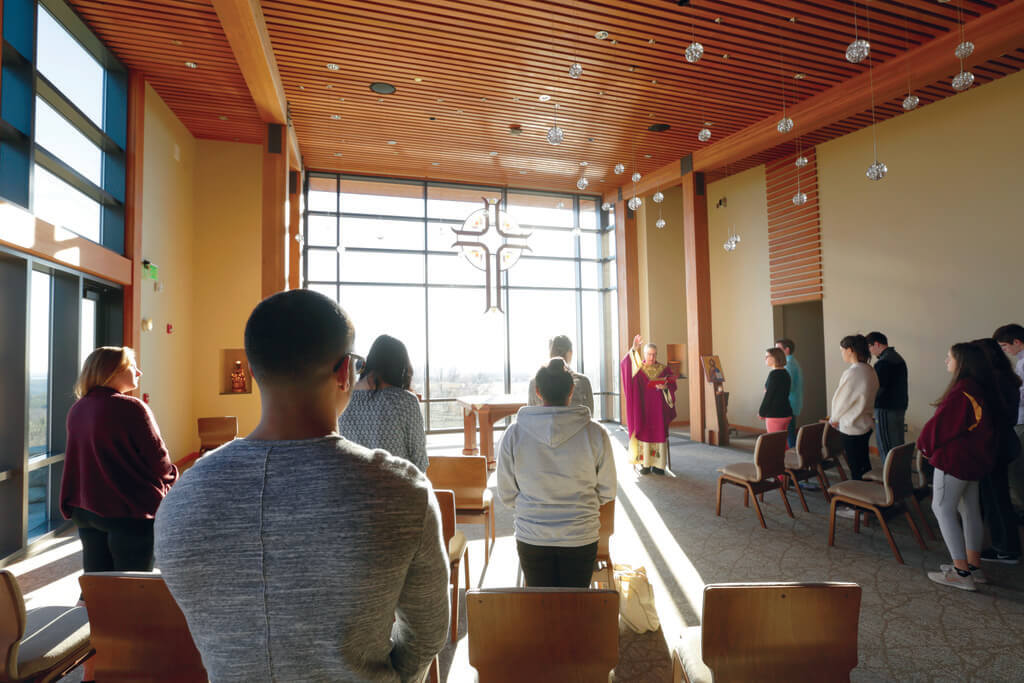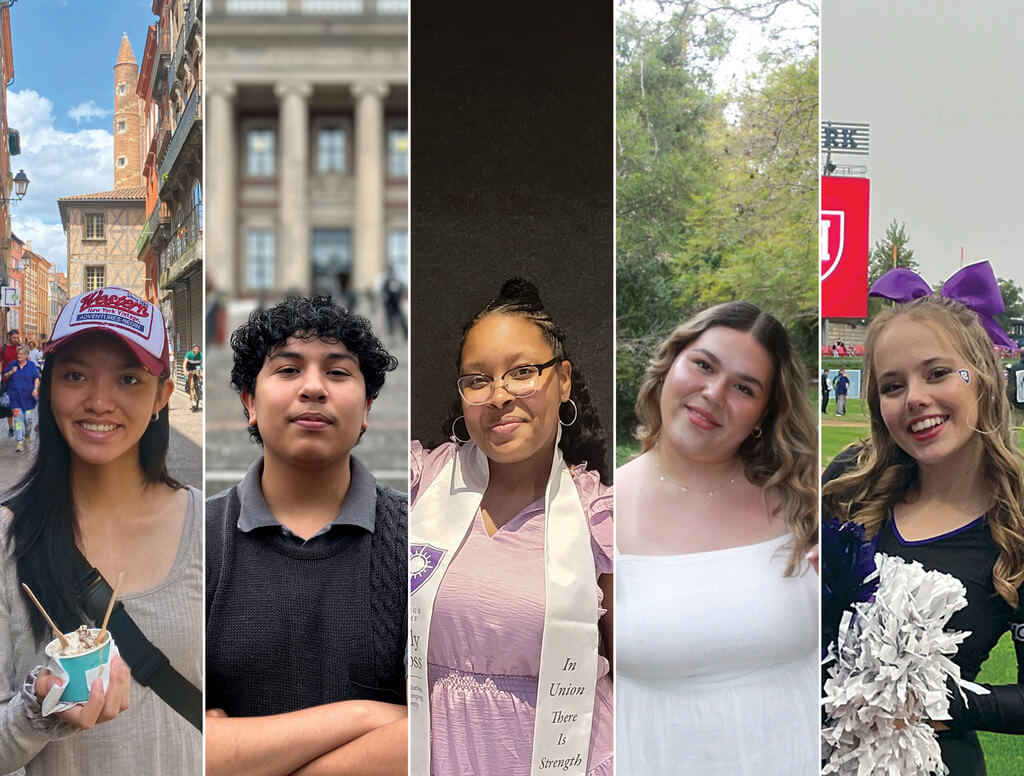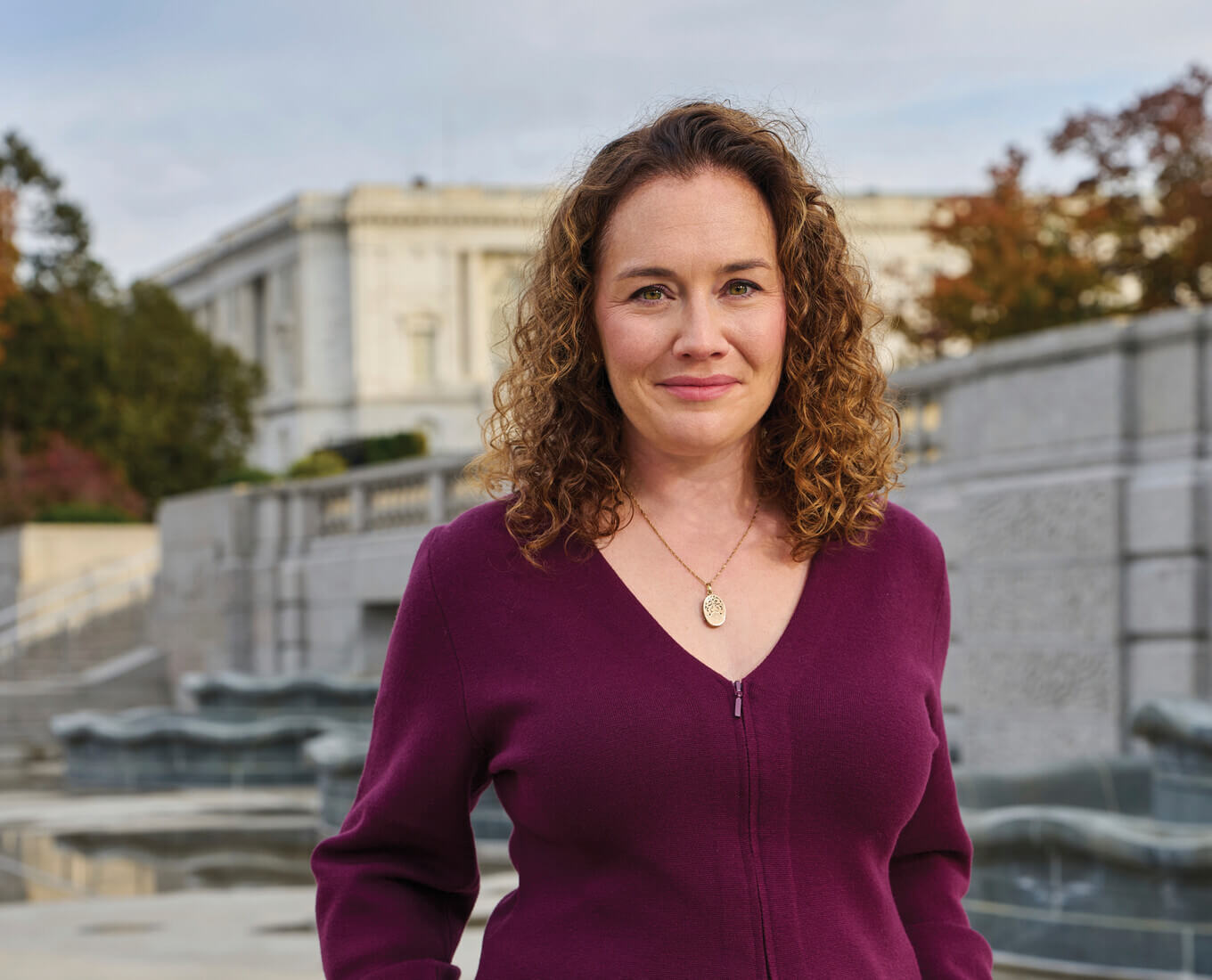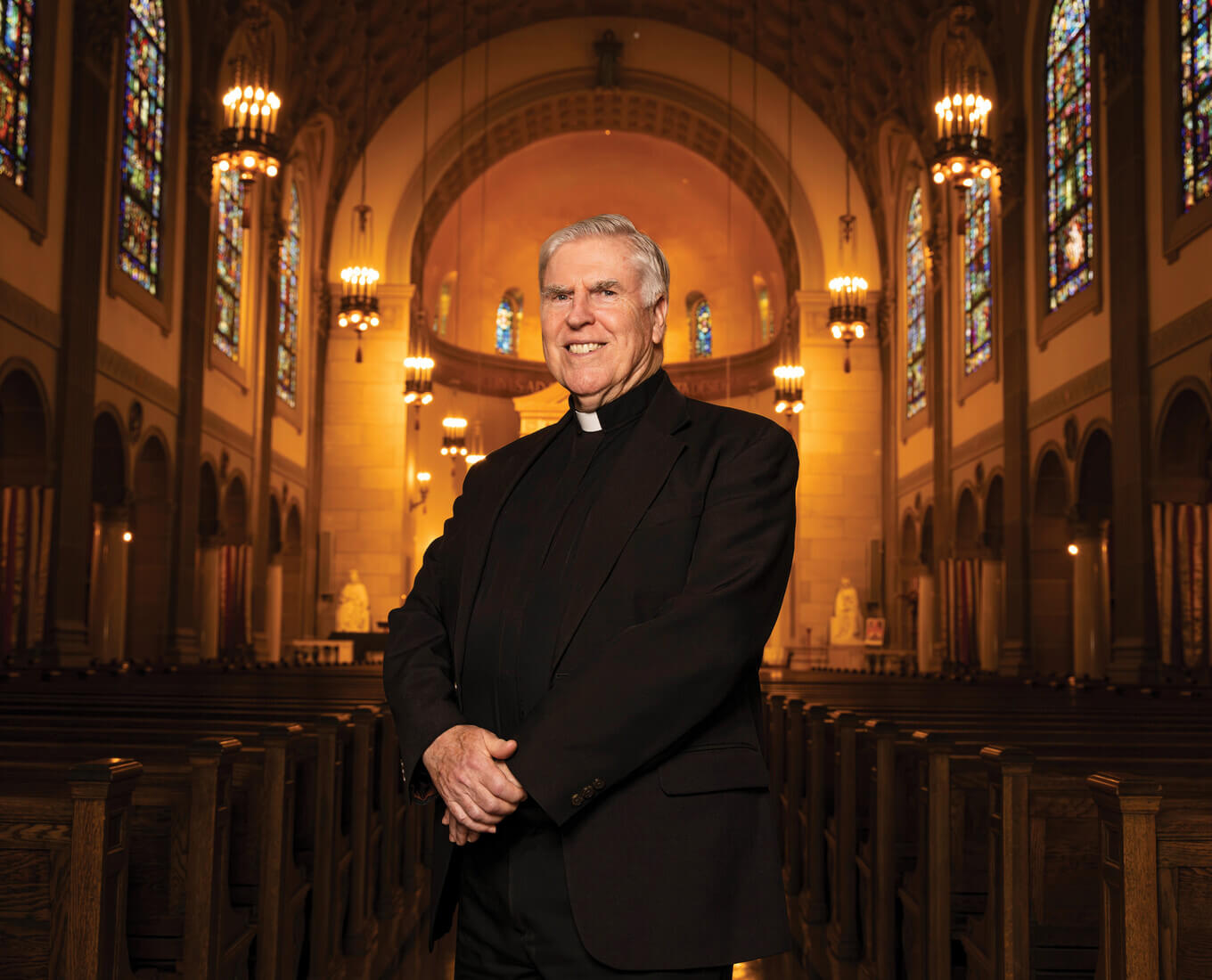To create a culture of constructive dialogue is to think and work together, says Michele Murray, senior vice president for student development and mission. In the summer of 2023, the College partnered with the Constructive Dialogue Institute, a nonprofit that trains students, faculty and staff to facilitate difficult conversations. In the spring and summer of 2024, first-year students, orientation leaders, peer educators, and some faculty and staff received training.
“We’re trying to help people learn dialogue skills that have clearly been lost in our society,” Murray says. “Social media use contributes to that — the way people troll each other rather than engage in spirited debate. The idea here is that we can think together, that we don’t have to agree on things, but that there are better ways to disagree and learn from each other without being disagreeable.”
In a democratic society, disagreement is an indicator of a community’s health, maybe even its cohesion, says Michelle Bata, associate dean for student engagement.
“We respect others’ lived experiences and opinions — and what it means to be in a community: that we all have to try to work together, even if we don’t always agree,” Bata says. “None of these efforts is at all intended to try to get people to think the same or to dissuade them from disagreement, or to discourage vigorous disagreement or protests. All such things are part of a healthy democracy. When you’re in a community, it requires difficult conversations.”
Murray’s and Bata’s comments echoed those of College President Vincent D. Rougeau at this year’s Mass of the Holy Spirit, which welcomed the class of 2028: “Here, you will be encouraged to speak up and engage. When, how and with whom are up to you. You will have your certainties challenged and perspectives broadened. And, trust me, you will thrive.”
• • • • • •
Constructive dialogue, proponents say, is about ensuring that academic freedom and freedom of expression can coexist.
The tensions that inflamed college and university campuses across the country in spring 2024 are not expected to dissipate anytime soon. Global conflicts, the presidential election and concern for students’ mental and physical well-being have prompted higher education to reconsider how it models reasoned discourse, empathy and civic harmony for students.
Daniel Klinghard, professor of political science and dean of education and academic experience, is part of a group of faculty and staff that has been talking about expression on campus for years. In spring 2023, Klinghard, Ellen E. Perry, Monsignor Edward G. Murray Professor of the Arts and Humanities, and others in that group held a conference on free expression on college campuses that convened scholars and practitioners from across the United States.
Daniel Klinghard, professor of political science and dean of education and academic experience, says the College is working to build a different type of campus atmosphere around discussing challenging topics.
“We were trying to move beyond the popular headline version of expression on campus and get people to think about how to engage in productive, respectful and meaningful conversations,” he says.
The scholars agreed that responsible and respectful discourse was one of the most important factors in academic freedom and free expression on campus. Therefore, it’s a real problem if students won’t share their opinions on controversial matters.
At the conference, a colleague of Klinghard’s from Marquette University mentioned that that school had started events called Dialogue Dinners, an idea that gained traction on The Hill almost immediately.
“We have a group of people here who are really dedicated to intentionally creating a different kind of campus atmosphere where we don’t have students who can’t talk to each other, where we don’t have political fights that erupt into hostility, but where instead we have a community trying to engage in creating a healthy culture of campus expression,” Klinghard says. “And it’s really a cross-campus partnership. My guess is that if you went to college campuses around the country, there are examples of other efforts like this. But there are few places where student affairs and academic affairs and the Chaplains’ Office are working on these efforts together.”
At Holy Cross, this goal of civil discourse underpins several other initiatives:
• Students Promoting Expression, Empathy, and Civic Harmony (SPEECH) Peer Educator training.
• Constructive dialogue training for student leaders.
• Online training, called Perspectives, for first-year students.
• Anticipated programming in the weeks leading up to and directly after the United States presidential election, which includes a webinar for families on how to support their student during election season.
Advocates cite The Spiritual Exercises of St. Ignatius Loyola and his teaching known as the Presupposition, specifically this passage: “It should be presupposed that every good [person] ought to be more eager to put a good interpretation on a neighbor’s statement than to condemn it. Further if one cannot interpret it favorably, one should ask how the other means it. If that meaning is wrong, one should correct the person with love; and if this is not enough, one should search out every appropriate means through which, by understanding the statement in a good way, it may be saved.”
The principles of constructive dialogue hew closely to the sentiments expressed in St. Ignatius' teaching, the Presupposition.
The principles of constructive dialogue hew closely to the sentiments expressed in the Presupposition, Murray observes: “We’re using tools to put the Presupposition into language that students today will understand. This process is about building skills that help us lean more deeply into who we are as an institution and the values that guide us. In my experience, that’s what the Jesuits and Jesuit education are all about.”
• • • • • •
In 2024, for the first time, first-year student orientation expanded to a five-day program. After Move-In Day in late August, students got to the business of orientation, receiving a dizzying amount of information about campus life. Alongside spirit night, music bingo and mini golf were presentations and activities centered on mental health, self-care and wellness, consent and boundaries, community engagement and how to talk to one another.
Jessica Nguyen ’28, Sebastian Torres ’28, Arianna Moore ’24, Sofia Arias ’28 and Maggie Baughman ’27 have all participated in the College’s Dialogue Dinners. “Students want to have these conversations," Moore says.
Formal discussions around dialogue took two forms: lecture and dinner discussion. “Conversations that Connect: Engaging with Different Perspectives” offered students tips and strategies for constructive dialogue, with SPEECH Peer Educators performing skits and offering their own accounts of conversations around touchy subjects. A second event, a Dialogue Dinner, found 53 first-year students engaged in conversation around cancel culture.
The event, held in Hogan Campus Center, started with a criteria for conversation, a series of “communication agreements,” the first of which paraphrased the Presupposition: “Be more eager to put a good interpretation on a neighbor’s statement than to condemn it.”
Guiding the conversation at the dinner was Ben Franzone ’26, a political science and sociology major, Student Government Association Speaker of the Senate and Senator at Large, SPEECH Peer Educator and a two-time orientation leader. He was recruited to be a SPEECH Peer Educator by Caitlin MacNeil ’13, associate director for leadership development at Holy Cross. In this role, Franzone’s job is to educate his fellow students on what constitutes constructive dialogue.
“Dialogue Dinners are an opportunity for students to share a meal while also having a conversation about a topic that might feel uncomfortable or might be different from something students are learning in the classroom,” Franzone says. “I do think that there is a need for spaces on campus to have dialogue, to have discussions, to have conversations about topics we may not be comfortable with or that may challenge our views.”
Over the 2023-2024 academic year, Dialogue Dinners topics focused on the Israeli-Palestinian conflict, the 2024 election and social media. At orientation, first-year students indicated they’d be interested in future dinners that focused on reproductive rights, climate change and immigration.
In May 2024, the SPEECH Peer Educators Program won the College’s 2024 Student Leadership Award for groundbreaking organization in its inaugural year. Students for Life, the Feminists Forum and other student groups with philosophical or political differences have sought SPEECH Peer Educators’ services in engaging with one another.
Arianna Moore ’24 was one of the first SPEECH Peer Educators.
“Students want to have these conversations and are very open to sharing their opinions or beliefs — in the right environment,” Moore says. “This space, along with many others, is what makes Holy Cross an inclusive and caring community. It’s also one way I believe the College ensures they are sending people out into the world that are respectful, understanding and accepting of all people with all views.
“I think this will change the culture and community at Holy Cross in a positive and major way,” she continues. “It will build a student body that centers openness, respect and dialogue, which is so hard to have during these times. I’m looking forward to returning to Holy Cross and seeing a community that cares, respects and values all people.”

